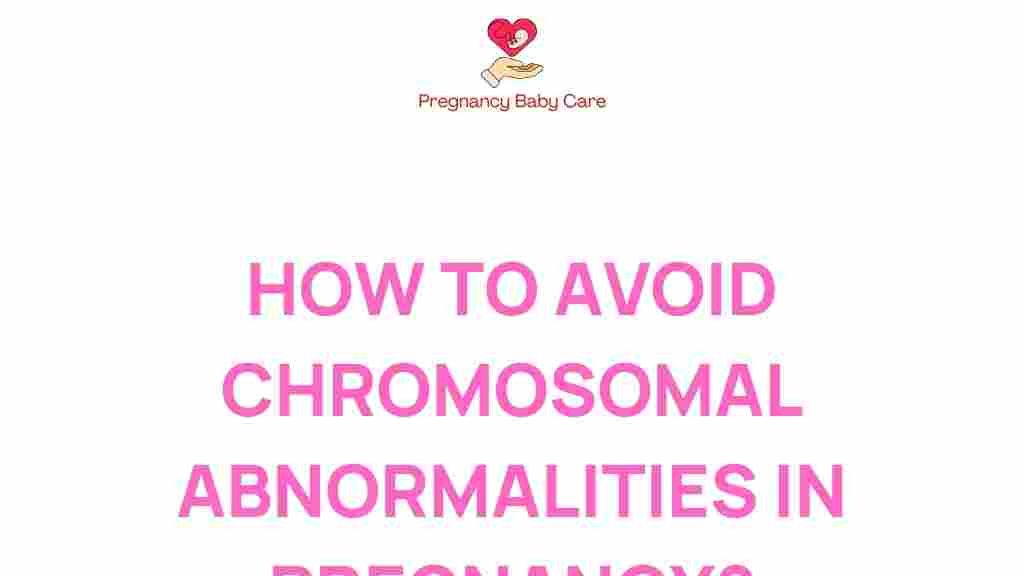Unraveling the Mystery: How to Avoid Chromosomal Abnormalities in Pregnancy
Pregnancy is a beautiful journey, yet it comes with various concerns, one of which is the risk of chromosomal abnormalities. Understanding how to minimize these risks is crucial for ensuring pregnancy health and the well-being of both mother and baby. This article delves into the intricacies of chromosomal abnormalities, examining their causes, risk factors, and the essential steps expectant parents can take to promote healthy fetal development.
Understanding Chromosomal Abnormalities
Chromosomal abnormalities occur when there is an error in the number or structure of chromosomes, which can lead to various health issues in the fetus. These abnormalities can be classified into two main categories:
- Numerical abnormalities: This occurs when there is an extra chromosome (e.g., Down syndrome, which is caused by an extra copy of chromosome 21) or a missing chromosome.
- Structural abnormalities: These involve changes in the structure of chromosomes, such as deletions, duplications, or translocations.
Both types of chromosomal abnormalities can impact fetal development and may lead to complications during pregnancy or health issues for the child after birth.
Risk Factors for Chromosomal Abnormalities
Several risk factors can increase the likelihood of chromosomal abnormalities during pregnancy. Understanding these factors can help expectant parents take proactive measures.
- Maternal Age: Women over the age of 35 have a higher risk of chromosomal abnormalities due to the aging of eggs.
- Family History: A history of chromosomal abnormalities in the family can increase the risk.
- Environmental Factors: Exposure to certain environmental toxins, such as radiation or harmful chemicals, can potentially increase risks.
- Pre-existing Health Conditions: Conditions such as diabetes or thyroid disorders may contribute to chromosomal risks.
- Genetic Factors: Certain genetic disorders can predispose a couple to having children with chromosomal abnormalities.
Importance of Prenatal Care
Prenatal care is vital for monitoring the health of both the mother and the fetus. Regular check-ups allow healthcare providers to identify potential issues early and manage them effectively. Here’s how prenatal care contributes to preventing chromosomal abnormalities:
- Regular Screenings: Routine screenings help detect any potential chromosomal issues early in pregnancy.
- Genetic Counseling: For couples with a family history of chromosomal abnormalities, genetic counseling can provide valuable insights and guidance.
- Monitoring Maternal Health: Keeping track of the mother’s health status can prevent complications that may affect fetal development.
Genetic Testing: A Key Component
Genetic testing plays a crucial role in identifying chromosomal abnormalities early in pregnancy. There are several types of genetic tests available:
- Carrier Screening: This test identifies whether parents carry genes for certain genetic disorders that could be passed on to their child.
- Non-Invasive Prenatal Testing (NIPT): A blood test that analyzes fetal DNA in the mother’s blood to assess the risk of chromosomal abnormalities.
- Chorionic Villus Sampling (CVS): A test that involves taking a sample from the placenta to test for genetic abnormalities, usually performed between 10-13 weeks of pregnancy.
- Amniocentesis: A procedure that involves taking a sample of amniotic fluid to analyze for chromosomal issues, typically performed between 15-20 weeks of pregnancy.
These tests provide essential information that can help parents make informed decisions about their pregnancy health.
Maternal Nutrition: Fueling Fetal Development
Proper maternal nutrition is fundamental in supporting fetal development and reducing the risk of chromosomal abnormalities. Here are some dietary guidelines:
- Folic Acid: Consuming adequate folic acid before and during pregnancy can significantly reduce the risk of neural tube defects and may help decrease the risk of certain chromosomal abnormalities.
- Balanced Diet: A well-rounded diet rich in fruits, vegetables, whole grains, lean proteins, and healthy fats is crucial for overall health.
- Avoiding Harmful Substances: Pregnant women should avoid alcohol, tobacco, and other harmful substances that can negatively impact fetal development.
- Hydration: Staying hydrated is essential for maintaining optimal health during pregnancy.
Consulting with a healthcare provider or a registered dietitian can help create an individualized nutrition plan to support pregnancy health.
Step-by-Step Process to Minimize Risks
Here’s a comprehensive step-by-step guide for expectant parents to minimize the risks of chromosomal abnormalities:
- Plan Preconception: Both partners should undergo genetic counseling and screening to identify any potential risks.
- Maintain a Healthy Lifestyle: Focus on a balanced diet, regular exercise, and avoiding harmful substances.
- Schedule Regular Prenatal Appointments: Ensure consistent check-ups with a healthcare provider to monitor health and development.
- Consider Genetic Testing: Discuss the need for genetic testing with your healthcare provider based on your family history and risk factors.
- Stay Informed: Educate yourself about pregnancy health and fetal development to make informed decisions.
Troubleshooting Tips for Expectant Parents
Even with the best preparations, concerns may arise during pregnancy. Here are some troubleshooting tips:
- Monitor Symptoms: Be aware of any unusual symptoms and consult your healthcare provider immediately if they arise.
- Stay Updated on Test Results: Follow up on genetic testing results and understand their implications for your pregnancy.
- Seek Support: Join support groups or counseling services for expectant parents to share experiences and advice.
- Communicate Openly: Maintain an open line of communication with your healthcare provider about any concerns or questions.
Conclusion
While the prospect of chromosomal abnormalities can be daunting, understanding the risk factors and taking proactive steps can greatly enhance pregnancy health and fetal development. Through comprehensive prenatal care, genetic testing, and a focus on maternal nutrition, expectant parents can significantly reduce the risks associated with chromosomal abnormalities.
Remember, every pregnancy is unique, and what works for one couple may not be applicable to another. Personalize your approach based on your specific needs and circumstances. For more information on prenatal care and pregnancy health, consider visiting this resource.
As we unravel the mystery of chromosomal abnormalities, knowledge is indeed power, empowering parents to create a healthy environment for their babies.
This article is in the category Pregnancy and created by PregnancyBabyCare Team
